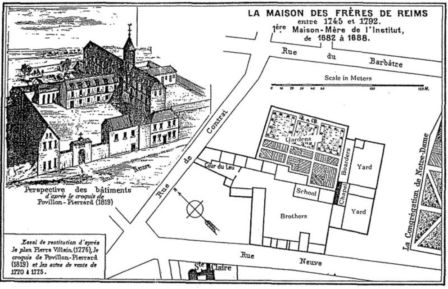Saint John Baptist de La Salle High School

A t the beginning of the summer of 1682, when John Baptist de La Salle and a few schoolmasters left Sainte - Marguerite Street and moved to Rue Neuve, the first of the free boys' schools had already been operating for three years. Then, they intended to form a "secular community" of men in the service of the schools for the poor. A t the time there several contiguous houses could accomodate different groups: the masters, who then named themselves Brothers; a group of people, future schoolmasters; some priests with seminarians; later, a “seminary” for the teachers of country parishes. All in all, about fifty people. T he building had an entrance on Rue Neuve (currently rue Gambetta) and another in the courtyard of Leu, overlooking rue de Contrai. The backyard was on the current premises of Saint John Baptist de La Salle High School. F or six years of his life, De La Salle lived here, in poverty and sometimes suffering from contempt of his contemporaries. Rue Neuve was an essential stage in his life: he resigned from his task of cannon, he sold his patrimony to help the poor during the famine of 1684, he changed the habit and the name of the community, finally the Brothers consecrated themselves by vows and elected a superior. T his place, which the Brothers occupied for many years, can rightly be said to have been the first of their houses and the cradle of the Institute of the Brothers of the Christian Schools. |